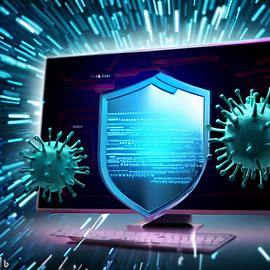Endpoint Security vs Antivirus? Which one? Or both?
As a small business manager, you’re tasked with wearing many hats. One of these is ensuring the security of your computer systems. This is no small feat.

You’ve likely heard terms like endpoint security and antivirus software thrown around, but what do they mean? And more importantly, how do they differ?
This article aims to demystify these terms and help you understand which security solution is best for your business.
Key Takeaways
- Antivirus Software: Protects individual devices using signature-based detection for known threats.
- Endpoint Security: Offers comprehensive protection for all network devices using advanced threat detection.
- Management: Endpoint security allows centralized management, saving time and effort.
- Complexity: Endpoint security is more complex and resource-intensive but offers broader protection.
What is Antivirus Software?
Antivirus software is a program designed to protect your computer from malicious software, also known as malware. It works by scanning your system in real time for known threats. This is often referred to as signature-based threat detection. This type of threat detection relies on a database of known malware signatures to identify potential threats.

Benefits of Antivirus Software
Antivirus software provides a crucial line of defense against external threats. It’s like a security guard, constantly monitoring your system for suspicious activity. When it detects a threat, it springs into action, isolating and removing the malware before it can cause damage.
Limitations of Antivirus Software
While antivirus software is an essential part of any cyber security strategy, it does have its limitations. For one, it’s not designed to centrally manage security across multiple devices. This means that each device in your network needs its own antivirus software, which can be time-consuming to manage.
What Is Endpoint Security?
Endpoint security, on the other hand, is a more comprehensive security solution. It’s designed to protect not just one device, but all the endpoints in your network. An endpoint can be any device that connects to your network, including desktop computers, laptops, and mobile devices.
Endpoint security goes beyond signature-based threat detection. It uses machine learning to identify and respond to threats, making it more effective at detecting new and emerging malware.
Benefits of Endpoint Security
The main benefit of endpoint security is its ability to centrally manage security across all your devices. This means you can control your entire network’s security from a single dashboard, saving you time and effort.
Endpoint security also includes antivirus protection, making it a more comprehensive solution. It’s designed to detect and respond to threats in real time, providing robust protection for your business.
Limitations of Endpoint Security
While endpoint security offers comprehensive protection, it can be more complex and resource-intensive than antivirus software. It may also require more technical knowledge to manage effectively.
Endpoint Security vs Antivirus: How do they compare?
Security Solution Scope
When comparing endpoint security vs antivirus, it’s important to understand that endpoint security is a broader solution. It includes antivirus protection, but also offers additional features like firewall protection, intrusion detection, and data loss prevention.
Management and Control
In terms of management and control, endpoint security has the upper hand. Its ability to centrally manage security across all your devices makes it a more efficient solution for businesses with multiple endpoints.
Detection and Response Capabilities
Endpoint security also excels in its detection and response capabilities. Thanks to machine learning, it can identify and respond to threats more quickly and accurately than antivirus software.
Endpoint Security vs Antivirus? Choosing the Right Solution for Your Business
Choosing between endpoint security and antivirus software depends on your business needs and the operating system you use. If you have a small number of devices and limited technical knowledge, antivirus software may be sufficient. However, you may have multiple devices to protect. If you have the resources to manage a more complex system, endpoint security could be a better fit.
Where do we go from here?
In conclusion, both endpoint security and antivirus software play a crucial role in protecting your business from cyber threats. By understanding the differences between them, you can make an informed decision about the best security solution for your business. Remember, the best defense is a good offense. Stay proactive and keep your business safe.
This article aimed to provide a clear, concise, and comprehensive comparison of endpoint security and antivirus software. We hope it has shed light on these important cyber security concepts. We hope that this article will help you make the best decision for your small business.
Questions? We Have Answers.
Get answers to a list of the most Frequently Asked Questions.
Yes, endpoint security is suitable for small businesses. It provides comprehensive protection across multiple devices and centralized management, making it easier to maintain security without extensive technical knowledge.

Experienced cybersecurity analyst, software engineer, patent attorney, worked with Linux, Windows, AWS, lots of security tools. Hope to help people do the right things and do the things right!

